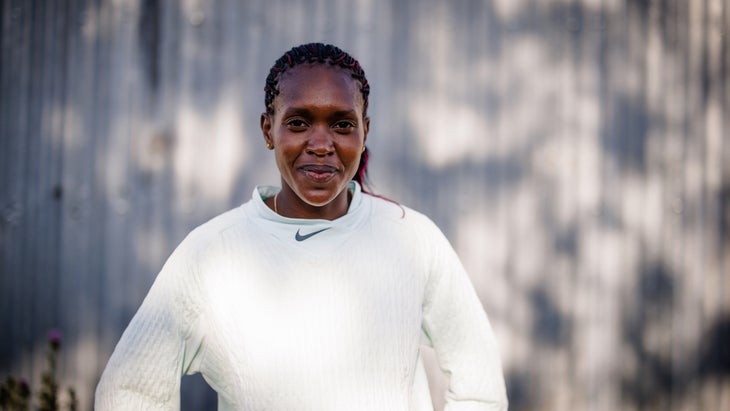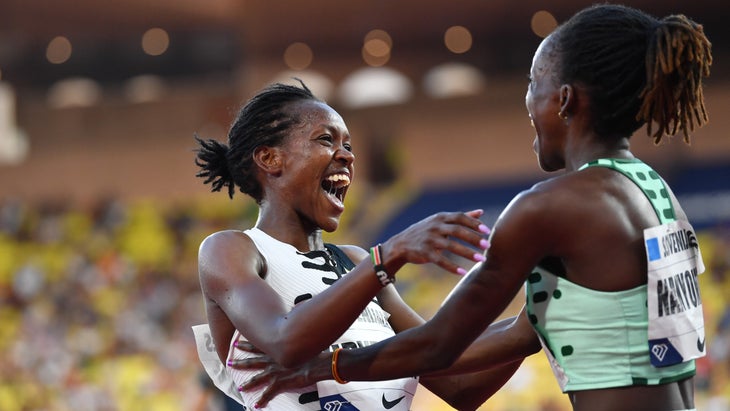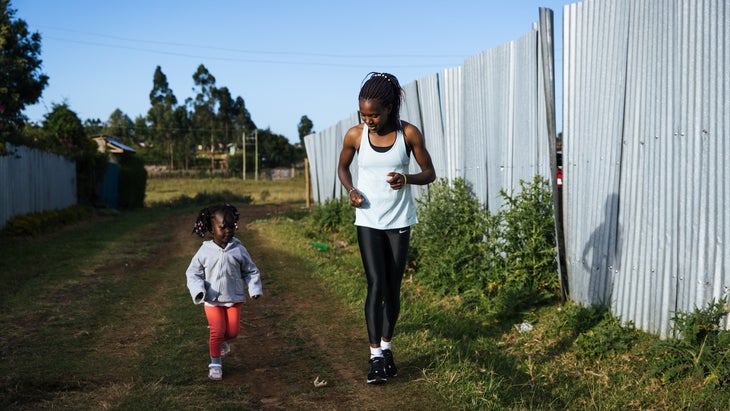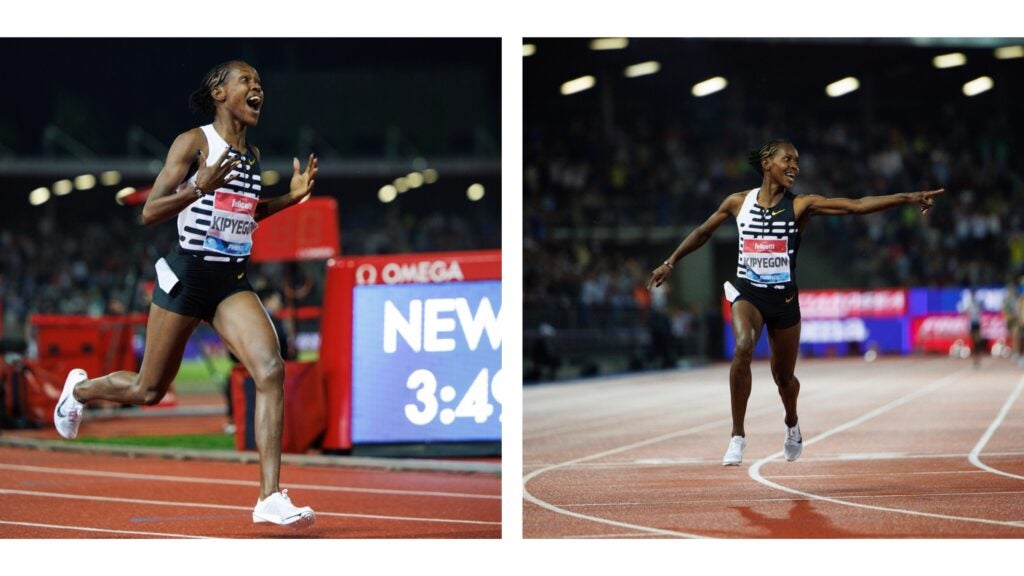No products in the cart.
Outdoor Adventure
Olympian Faith Kipyegon Just Broke Three World Records. She’s Not Slowing Down.
Record breaking is vital to track and field’s success as a sport; it’s what excites the public. But every so often an athlete goes beyond running, jumping, or throwing further than anyone else and enters uncharted territory, leading the next generation to even greater possibilities.
Thirty-seven years ago, Soviet runner Tatyana Kazankina became the first woman to dip under four minutes for the 1,500-meter distance. Since then, 130 women have “beaten four,” including Kenyan superstar and Nike athlete Faith Kipyegon, who has a sublime tally of 26 such clockings, the most of any woman ever.
On June 2, the 29-year-old broke through the next 1,500-meter barrier—3 minutes 50 seconds—in Florence, Italy, ushering in what must surely be a new era in women’s middle-distance running. At the finish, she pointed with disbelief at the stadium clock which read “3:49.11. World Record.” She shaved 96 one-hundredths off Genzebe Dibaba’s record (3:50.07).
Her dominance was such that she finished eight seconds ahead of Britain’s Laura Muir, the Tokyo Olympic silver medalist. Moreover, she covered her final lap in a blistering 58.9 seconds, which is simply unfathomable. But this history-making effort was just the beginning of a record-breaking spree on which Kipyegon embarked over the past several weeks.

She toppled the world 5,000-meter record seven days later and then, most recently, took five seconds off the women’s world mile record with a time of 4:07.64 in the Monaco Diamond League meet, on July 21. The mile is not an Olympic distance and is run infrequently on the international circuit. After her stunning 1,500-meter time, it was therefore not entirely unsurprising.
“I knew everything was possible. I was not going into it for the world 1,500-meter record, but it was still in my mind that I would do my best,” she says during a Zoom chat from the Global Sports Communication camp in Kaptagat, Kenya. This is where, for most of the year, she spends five days a week eating, sleeping, and training.
“I think I have shown the [next generation] the way that everything is possible and they can still break 3:49. It is achievable especially for me also. I can still achieve more than 3:49. I think I have shown them this is the barrier, but you can still go under this barrier.”
RELATED: Why Are Runners Suddenly So Fast?
Kipyegon has won both the Olympic and World Athletics Championships 1,500-meter titles twice. Despite her success, she is often described as humble, and her popularity on the circuit was evident in Florence. At the finish line, every one of her competitors was there waiting to congratulate her as she completed a lap of honor.
“This is sport,” Kipyegon says with a smile. “We have to accept the outcome of each day and each competition. For me, it was really emotional, for all the athletes coming together and we celebrated the world record together.”
“One of the Best Moments I Have Witnessed on the Track.”
Sebastian Coe, president of World Athletics, who won the Olympic 1,500-meter gold twice—and who also set a world record for the distance—was among those who witnessed this performance.
“It’s beyond significant. Significant doesn’t do it justice,” he says. “Any time you break a world record it’s a big moment in the history of our sport, but breaking the 3:50 barrier is particularly big. The bare statistic really doesn’t tell the whole story. I have rarely seen anyone do a last lap like that. It’s a mountainous achievement. That was one of the best moments I have witnessed on the track.”
Seven days after the 1,500-meter record, Kipyegon shocked everyone again with a world 5,000-meter record (14:05.20) in Paris. Remarkably, it was her first 5,000-meter race in eight years.
Among those vanquished inside Paris’ Stade Charlety stadium was Ethiopia’s Letesenbet Gidey, who had set the previous mark of 14:06.62 two years ago. The two are friends, and both are managed by Global Sports Communication, the Netherlands-based company. During the first three months of 2022, they even trained together in Kaptagat when Gidey sought respite from the war in Ethiopia’s Tigray province.
In truth, it was Gidey’s performance over this distance which had been the most anticipated, since Kipyegon couldn’t be expected to follow up her Florence result with another record-blazing effort.
“I was not expecting the world 5,000-meter record,” Kipyegon admits. “I was going there to enjoy twelve and a half laps, enjoy the event after eight years; to see what is possible in the 5,000 meter, and introduce my legs to the 5,000 meter. I was surprised to run a world record.”
Beating the mile record in Monaco emphasized her dominance of the middle distances and at a critical point in the season when championship medals became the focus.

Sights Sets on Worlds
Next up are the world championships August 19-27 in Budapest, Hungary, where she hopes to become the first woman to win three world 1,500-meter gold medals. And since she also won the Kenyan 5,000-meter trials, on July 7, she will aim for the 5,000-meter also. Her coach Patrick Sang’s task has been to find a way to limit outside distractions.
Indeed, following the Paris competition, she returned home to Kenya briefly, to spend time with her husband Timothy Kitum (the 2012 Olympic 800-meter bronze medalist) and their five-year-old daughter, Alyn, in the village of Kipkorgot. It was a rushed homecoming as she was whisked away to Nairobi at the behest of Kenyan President William Ruto.
At a reception, Ruto praised her as “a role model for consistency, discipline, hard work, and family values,” and then awarded her a three-bedroom house in Nairobi, as well as $35,000. Other dignitaries hosted receptions for her, too.
Despite Ruto’s generosity, Kipyegon has no plans to leave her home in Kipkorgot. For one thing, it is conveniently located just 15 minutes from the GSC training camp. And, although the power is unreliable during the rainy season, she is comfortable there. “I will still stay where I am and will stay humble and focused,” she says. “I still have a bright future ahead of me until the marathon, so I will still have to be focused and be myself. That’s the most important thing.”
Growing up in the small village of Keringat as one of nine children she was introduced to running by local school teachers. The success of Vivian Cheriuyot who took Olympic 5,000-meter silver and 10,000-meter bronze at the 2012 London Olympics before striking gold in the 2016 Olympic 5,000-meter in Rio de Janeiro, caught her attention.
“When I was a very young girl I used to see Vivian running, I used to say, ‘when I grow up I would like to run like Vivian,’” she remembers. “She was young like me. She has a very small body, like me, and she was very, very strong. I met her in 2012. I was still a junior and she talked to me, motivated me, and here I am. Now I can motivate the young ones as well.”
There have been several mentors since who have helped propel Kipyegon into another stratosphere. Besides Patrick Sang, it is Eliud Kipchoge, the legendary marathoner, whose humility had a great effect on her.
Upon returning to Kaptagat, her companions celebrated her latest triumph, though it was an abbreviated occasion. The need to get back into world championship preparations was foremost on Patrick Sang’s mind. Still, Kipyegon enjoyed the moment. “It was emotional going back to the camp,” she remembers. “I can say it’s my second home. Here you stay with your team from Tuesday to Saturday.
“I returned with two world records. It was amazing and at the same time emotional because they had a cake with a “world record 1500 meter and world record 5000 meter” written on it, so we celebrated and had fun together.”
The following morning, the team was up at sunrise to begin their training sessions. When asked if the group took it easy on her on those first few runs, Kipyegon shakes her head and laughs loudly.
“No, I struggled a little bit but it was OK,” she concedes. “When my coach is there I just concentrate on the coach, and I don’t concentrate on my mind because if I concentrate on my mind I would just collapse.”
RELATED: 10 Stunning Performances from the U.S. Track and Field Championships
Sang is probably best known for his success at guiding Kipchoge to two Olympic marathon titles and the world marathon record. But he understands middle-distance running, too. At the 1992 Olympics, he claimed the silver medal in the 3,000-meter steeplechase. He somehow blends the training programs of both middle-distance and marathon groups in camp.
“Yes, absolutely we do all the training together,” Kipyegon explains. “We do the long runs together, the easy runs together, especially when we are starting the season. But when track season comes, we become separated. Track athletes train by themselves and marathoners by themselves.
“I can say I train with [the marathoners] most of the time because they give me energy to still push myself—especially seeing Eliud on easy runs and long runs—it gives me motivation to know that everything is still possible. I can still follow the footsteps of Eliud and run the marathon in the future.”
Running for Something Bigger

Although things are changing, and women are being appointed to important positions in Kenyan society, there is still troubling data. Young Kenyan women and adolescent girls, in particular, continue to be vulnerable to poverty and gender-based violence. According to statistics provided by USAID, 34 percent of women aged 15-49 have experienced physical violence. Kipyegon might be uniquely placed to make a difference in emboldening women.
“Absolutely, that is in my plan to visit schools and visit young girls,” she says. “It is not easy when the season is still on and you are focused on bigger fish like the world championships, and everybody wants you to go here and go there, and your focus is still training. After the season, I will do some visits to camps. What is in my heart is to talk with the young girls and young women to believe in themselves.”
Faith Kipyegon has earned a place among the greatest middle-distance runners of all-time with her championship record and three world records.
Coe is clear where her place is in history. “If she wins the world championships in Budapest this year and the Olympics in Paris next year, that is given to very few. It will make her almost unassailable,” Coe declares. “It would take brave arguing to say she wasn’t the best of all-time—she’s pretty close now. A double is rare, but three in middle-distance running would be unique.”
Source link

